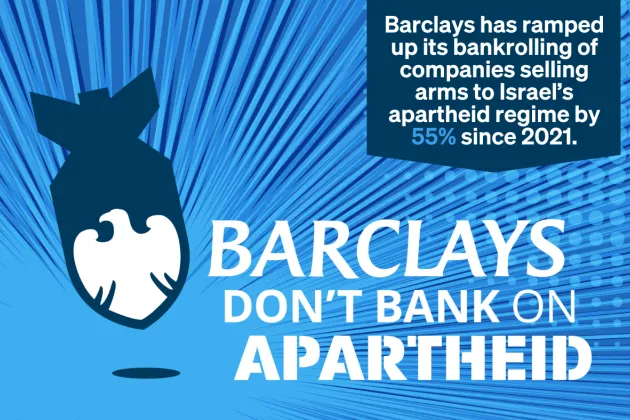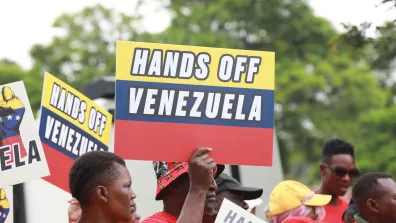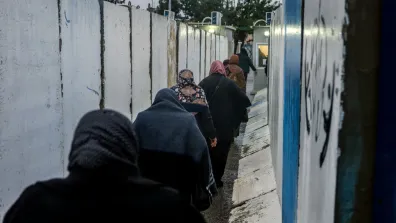Israel’s occupation is illegal, rules International Court of Justice

The world’s top tribunal for disputes between countries, the International Court of Justice (ICJ), has stated that Israel’s 57-year occupation of the occupied Palestinian territory (oPt) is illegal.
While the Palestinian people and human rights organisations including War on Want have campaigned on this for years, the ICJ’s ruling carries enormous political weight. The illegality of Israel’s occupation and apartheid regime can no longer be disputed.
This ground-breaking statement from the ICJ, given on 19 July 2024, is a rallying cry for boycott, divestment and sanctions against Israel: countries not only have to help end Israel’s occupation – including by ending arms transfers and trade deals – but stop businesses from operating in, or importing goods from, Israel’s illegal settlements.
Israel’s occupation is illegal and must end
The ICJ’s advisory opinion, states not only that Israel’s occupation is illegal – but that it must end as soon as possible. And the court demands much more: that Israel’s illegal settlements must be evacuated and Israeli settlers must leave the oPt; Palestinians who were forced out of the oPt must be allowed the right to return; Palestinians must receive reparations in compensation for their losses; and that Israel is denying the Palestinian people the right to self-determination – preventing them from living freely, growing and developing as a people and culture.
The ICJ’s ruling is historic, and long overdue: this is the first time an international court of this standing has looked, in detail, at Israel's policies and practices in the oPt – and come to such an unequivocal and sweeping conclusion. The court examined Israel’s prolonged occupation, settlement policies, confiscation of Palestinian land and transfer of its own civilian population, forced displacement of the Palestinian population, exploitation of natural resources, violence against Palestinians, extension of Israeli law, and discriminatory legislation and measures. The conclusion:
The sustained abuse by Israel of its position as an occupying Power, through annexation and an assertion of permanent control over the Occupied Palestinian Territory and continued frustration of the right of the Palestinian people to self-determination, violates fundamental principles of international law and renders Israel’s presence in the Occupied Palestinian Territory unlawful.
A damning conclusion: Israel’s policies and practices are apartheid
The ICJ’s damning conclusion is that Israel’s brutal, systematic discrimination against Palestinians in the oPt constitutes apartheid. War on Want, Palestinian and Israeli human rights organisations have said this for many years – and global human rights groups including Amnesty International and Human Rights Watch have more recently echoed this position – that Israel’s system of oppression is apartheid.
On the basis of the Court’s finding ... Israeli policies, legislation and practices involve widespread discrimination against Palestinians in nearly all aspects of life much like the case in apartheid South Africa
1While the ICJ’s advisory opinion itself is not legally binding, it carries great legal weight and moral authority, as legal advice which clarifies and aids the development of international law – and strengthens peaceful relations between countries. The ICJ found that Israel is breaching many international laws and legally-binding treaties which it has signed on to. Israel, like all other countries, is accountable to international law – and it is therefore acting unlawfully.
But many politicians in the UK and around the world have turned a blind eye to Israel’s human rights violations – and refused to acknowledge Israel’s persistent, systematic discrimination against the Palestinian people as apartheid.
Why did the ICJ rule on Israel’s occupation?
In December 2022, the United Nations General Assembly (UNGA) – made up of all 193 UN member countries – voted in a resolution requesting for the ICJ, the highest legal body of the UN, to provide an advisory opinion on the ‘legal consequences arising from the policies and practices of Israel in the oPt’. Legal arguments were presented by 52 countries, many of them from the Global South – the largest number of countries to participate in any single case in the ICJ’s history.
The international community must act
The ICJ’s ruling that Israel is perpetrating apartheid against the Palestinian people not only confirms what campaigners for justice and Palestinians themselves have known for years, but it is a rallying cry for boycott, divestment and sanctions against Israel until it ends its discriminatory laws, policies and actions.
The ICJ makes it clear that the UK and other countries have a responsibility to help end Israel’s occupation – not only in words, but by taking decisive action.
While the UK government recognises that Israel’s settlements in the oPt are illegal2, it hasn’t done anything about it, in practice. The UK must not aid or abet Israel’s occupation in any way – which means that the UK government must: prevent UK-based businesses from investing or operating in Israeli settlements; ban all produce made in the settlements; and stop supplying arms to Israel, which it uses to sustain its illegal occupation.
If Israel is not prepared to separate its financial and economic activities between Israel and the oPt, then businesses and banks must stop doing business with Israel, to avoid complicity.
The UK government should start by standing behind the ICJ’s opinion – when so far it has been silent. Israel and its leaders must be held to account for their actions, meaning the UK government should unequivocally support the rulings of the ICJ and the International Criminal Court (ICC). The ICJ ruling provides clear grounds for the ICC to prosecute Israeli officials who have authorised the creation and expansion of Israeli settlements, Israel’s apartheid regime – and Israel’s severe violations of international law committed against Palestinians because of it.
But the impact of ICJ’s opinion stretches far beyond governments and corporations – it is a call to all people around the world to hold Israel to account through activism. The boycott, divestment and sanctions (BDS) movement – which helped bring an end to South Africa’s apartheid – will be bolstered by the ICJ’s ruling in campaigning to end UK complicity in Israel’s violations of international law.
Solidarity with the Palestinian people
The struggle is far from over, and Israel’s genocidal violence against the Palestinian people in the Gaza Strip continues, with Israel seemingly undeterred despite people around the world standing together against its actions. However, the ICJ’s opinion is momentous – and signals a potential beginning of the end for Israel’s occupation and apartheid.



